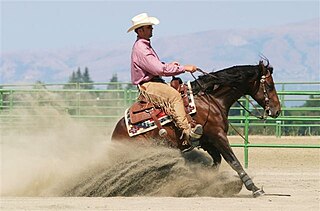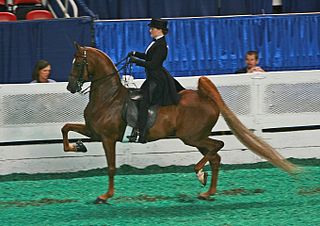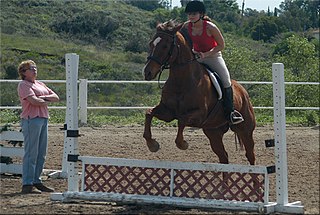
Dressage is a highly skilled form of riding performed in exhibition and competition, as well as an "art" sometimes pursued solely for the sake of mastery. As an equestrian sport defined by the International Equestrian Federation, dressage is "the highest expression of horse training" where "horse and rider are expected to perform from memory a series of predetermined movements."

The Tennessee Walking Horse or Tennessee Walker is a breed of gaited horse known for its unique four-beat running-walk and flashy movement. It was originally developed in the southern United States for use on farms and plantations. It is a popular riding horse due to its calm disposition, smooth gaits and sure-footedness. The Tennessee Walking Horse is often seen in the show ring, but is also popular as a pleasure and trail riding horse using both English and Western equipment. Tennessee Walkers are also seen in movies, television shows and other performances.

Reining is a western riding competition for horses where the riders guide the horses through a precise pattern of circles, spins, and stops. All work is done at the lope, or the gallop. Originating from working cattle, reining is often described as a Western form of dressage riding, as it requires the horse to be responsive and in tune with its rider, whose aids should not be easily seen, and judges the horse on its ability to perform a set pattern of movements. The horse should be willingly guided or controlled with little or no apparent resistance and dictated to completely. A horse that pins his ears, conveying a threat to his rider, refuses to go forward, runs sideways, bounces his rear, wrings his tail in irritation or displays an overall poor attitude is not being guided willingly, and is judged accordingly.
Equitation is the art or practice of horse riding or horsemanship.

Endurance riding is an equestrian sport based on controlled long-distance races. It is one of the international competitions recognized by the FEI. There are endurance rides worldwide. Endurance rides can be any distance, though they are rarely over 160 km for a one-day competition.

Western Pleasure is a western style competition at horse shows that evaluates horses on manners and suitability of the horse for a relaxed but collected gait cadence and relatively slow speed of gait, along with calm and responsive disposition. The horse is to appear to be a "pleasure" to ride and very comfortable, while being very smooth. Most light horse breeds in the United States and Canada may compete in western pleasure classes, either in open competition or at shows limited to a single breed. However, horse conformation and temperament play a role in this event, and hence animals that are calm, quiet, have collected, soft gaits and the strong muscling required to sustain slow, controlled movement are the most competitive.

Saddle Seat is a style of horseback riding within the category of English riding that is designed to show off the high action of certain horse breeds. The style developed into its modern form in the United States, and is also seen in Canada and South Africa. To a much lesser extent, it is ridden with American action horse breeds in Europe and Australia. The horse breeds mainly used for this flashy style are typically the showy Morgan Horse, and the high stepping American Saddlebred.

An equestrian helmet is a form of protective headgear worn when riding horses. This type of helmet is specially designed to protect the rider’s head during falls off a horse, especially from striking a hard object while falling or being accidentally struck in the head by a horse’s hoof.

A riding instructor is a person whose job it is to teach methods of horse riding to beginners and improve the intermediate and advanced rider's style and technique. A riding instructor may also serve as a coach for a rider in competition. Some instructors may work out of their own riding facility, others at a riding school or training center. With appropriate academic credentials, some may teach in a college or university equestrian studies program. Yet others freelance and travel from stable to stable.

Tent pegging is a cavalry sport of ancient origin, and is one of only ten equestrian disciplines officially recognised by the International Equestrian Federation. Used narrowly, the term refers to a specific mounted game with ground targets. More broadly, it refers to the entire class of mounted cavalry games involving edged weapons on horseback, for which the term "equestrian skill-at-arms" is also used.
Robert Jeffrey Dover is an American equestrian who has had international success in the sport of dressage. Riding from the age of 13, he began specializing in dressage at age 19 and competed in his first Olympics in 1984. He competed in every summer Games between 1984 and 2004, winning four team bronze medals. He also took a team bronze at the 1994 World Equestrian Games. Dover is the most honored dressage rider in the United States, and has been inducted to the United States Dressage Federation Hall of Fame. Outside of competition, Dover founded the Equestrian Aid Foundation in 1996 to assist others in the equestrian world, and hosted a TV show that searched for the next dressage star. From late 2009 to early 2011, Dover served as the Technical/Coach Advisor for the Canadian national dressage team. In April 2013, Dover was named Technical Advisor/Chef d'Equipe for the US national dressage team.
George H. Morris is an American trainer and judge of horses and riders in hunter and show jumper competition. He is considered a "founding father" of hunt seat equitation. He also was a chef d’equipe for the United States Equestrian Federation (USEF), show jumping team.
The Arabian Horse Association (AHA) is the single national organization that is the only breed registry that registers Arabian horses in the United States. It also works with the United States Equestrian Federation to sanction horse shows and license judges for Arabian horses.

Impulsion is the movement of a horse when it is going forward with controlled power. Related to the concept of collection, impulsion helps a horse effectively use the power in its hindquarters. To achieve impulsion, a horse is not using speed, but muscular control; the horse exhibits a relaxed spinal column, which allows its hindquarters to come well under its body and "engage" so that they can be used in the most effective manner to move the horse forward at any speed.
Trail is a competitive class at horse shows where horses and riders in western-style attire and horse tack navigate a series of obstacles. Contestants ride the course one at a time. Originally designed to resemble situations a horse and rider might actually encounter when on a trail in a natural habitat, modern trail classes now tend to focus more heavily on agility and manners, with courses bearing very little resemblance to real-world natural trails.

Sheila Varian was a breeder of Arabian horses who lived and worked at the Varian Arabians Ranch near Arroyo Grande, California. She grew up with a strong interest in horses, and was mentored in horsemanship by Mary "Sid" Spencer, a local rancher and Morgan horse breeder who also introduced Varian to the vaquero or "Californio" tradition of western riding. She started her horse ranch, Varian Arabians, in 1954 with the assistance of her parents. Raising and training horses was her full-time occupation beginning in 1963. She used vaquero-influenced methods of training horses, although she adapted her technique over the years to fit the character of the Arabian horse, which she viewed as a horse breed requiring a smart yet gentle approach.
A horse passport is documentation that allows horses to be accurately identified and more easily be transported internationally. In the United States, they are primarily intended for animals competing in International Federation for Equestrian Sports (FEI) events. In the United Kingdom, it is now required for all equines to have a "passport" and an animal cannot be sold without one.

The Colorado Hunter Jumper Association (CHJA) is a competition-based sport organization within the state of Colorado. CHJA serves many types of riding including hunt seat, equitation, showjumping, dressage, cross country, and eventing. CHJA offers many programs throughout each calendar year including challenges, charity events, networking events, riding clinics, schooling shows, and horse shows. Hunter/jumper horse shows hosted in Colorado are organized through CHJA. Each horse show season lasts from March to October, and points are added up for both riders and horses throughout the season. Only CHJA members and registered horses are eligible to earn points. At the end of each season, awards are presented to riders, horses, and barns/teams based on the total number of points they earned throughout the season.














